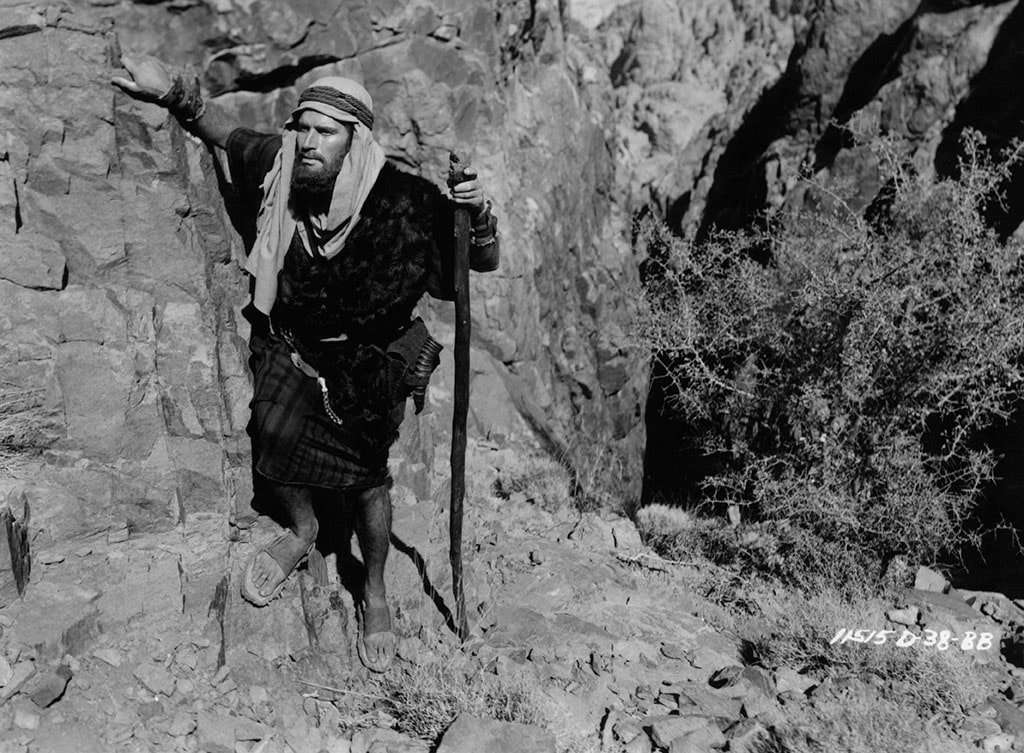 Charlton Heston climbs up a mountain in a scene from the film ‘The Ten Commandments’, 1956. (Photo by Paramount/Getty Images)
Charlton Heston climbs up a mountain in a scene from the film ‘The Ten Commandments’, 1956. (Photo by Paramount/Getty Images) In the movie The Ten Commandments at the Burning Bush when Moses, Charlton Heston,
was addressed by God The One Almighty,
Cecil B. DeMille did not know whose voice he should use for God. He wasn’t jestin’,
when he chose Charlton, gunman, PC righty.
Cecil’s choice to speak the voice of God was Moses’ Jewish father, Levite Amram.
The fire melting media-Moses’ ice is
lit by the flame of insight to his roots, when hearing God explain “I Am Who I Am,”
resolving his identity’s great crisis,
in contrast to the way the crisis of identity of Jews has been exacerbated
by being zapped as Zionistic colonizers,
the question, whether to be or not to be when bated
at them, distressing the Old Faithful geysers.
The movie The Ten Commandments, was made by Cecil B. DeMille in 1956, when Charlton Heston was still a liberal Democrat. Rabbi Meir Soloveichik pointed out that DeMille suggested that the voice of God addressing Moses from the Burning Bush should be that of his father, Amram.
My poem follows Rabbi Lord Jonathan Sacks’s interpretation of Exod. 3:11:
יא וַיֹּאמֶר מֹשֶׁה, אֶל-הָאֱלֹהִים, מִי אָנֹכִי, כִּי אֵלֵךְ אֶל-פַּרְעֹה; וְכִי אוֹצִיא אֶת-בְּנֵי יִשְׂרָאֵל, מִמִּצְרָיִם. 11 And Moses said unto God: ‘Who am I, that I should go unto Pharaoh, and that I should bring forth the children of Israel out of Egypt?’
God had introduced himself to Moses in Exod. 3:6 as the God of his ancestors:
Moses however still asks מִי אָנֹכִי, who am I? This is not a rhetorical question, asked in order to indicate his modesty. He asks this question because he suffers from an identity crisis.
The first word after the first verse of the Shema in Deut. 6:4 is ואהבת, v’ahavta, commanding all Israelites to love God. The medieval commentator Ba’al HaTurim explains that this word contains the letters האבות, ha’avot, meaning the forefathers, thereby implying that all Jews who recite the first verse of the Shema should follow the God-loving paradigm followed by Abraham, Isaac and Jacob. This suggestion not only anticipates Rabbi Sacks’s explanation of God’s declaration to Moses in the Burning Bush that He was the God of the patriarchs, but also justifies—presumably serendipitously—-Cecil B. DeMille’s decision to imply that God, when speaking to Moses at the Burning Bush, used the voice of his father Amram.
Gershon Hepner is a poet who has written over 25,000 poems on subjects ranging from music to literature, politics to Torah. He grew up in England and moved to Los Angeles in 1976. Using his varied interests and experiences, he has authored dozens of papers in medical and academic journals, and authored “Legal Friction: Law, Narrative, and Identity Politics in Biblical Israel.” He can be reached at gershonhepner@gmail.com.























 More news and opinions than at a Shabbat dinner, right in your inbox.
More news and opinions than at a Shabbat dinner, right in your inbox.